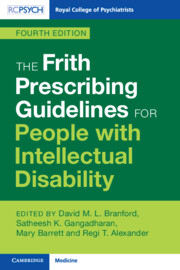Book contents
- The Frith Prescribing Guidelines for People with Intellectual Disability
- Reviews
- The Frith Prescribing Guidelines for People with Intellectual Disability
- Copyright page
- Contents
- Contributors
- Foreword
- Preface
- Acknowledgements
- Chapter 1 Intellectual Disability
- Chapter 2 Prescribing Practice
- Chapter 3 Physical Health Monitoring
- Chapter 4 Mental Health Conditions in People with Intellectual Disability
- Chapter 5 Trauma in People with Intellectual Disability
- Chapter 6 Anxiety Disorders
- Chapter 7 Depression
- Chapter 8 Bipolar Disorders
- Chapter 9 Schizophrenia
- Chapter 10 Aggression and Self-Injurious Behaviour
- Chapter 11 Personality Disorders
- Chapter 12 Sexual Offences and Paraphilias
- Chapter 13 Substance Use Disorders
- Chapter 14 Attention Deficit Hyperactivity Disorder
- Chapter 15 Autism
- Chapter 16 Sleep Disorders
- Chapter 17 Epilepsy
- Chapter 18 Dementia
- Chapter 19 Eating and Drinking Difficulties
- Chapter 20 Children and Adolescents
- Chapter 21 Prescribing for Health Issues in Women with Intellectual Disability
- Chapter 22 Older People
- Index
- References
Chapter 7 - Depression
Published online by Cambridge University Press: 07 November 2024
- The Frith Prescribing Guidelines for People with Intellectual Disability
- Reviews
- The Frith Prescribing Guidelines for People with Intellectual Disability
- Copyright page
- Contents
- Contributors
- Foreword
- Preface
- Acknowledgements
- Chapter 1 Intellectual Disability
- Chapter 2 Prescribing Practice
- Chapter 3 Physical Health Monitoring
- Chapter 4 Mental Health Conditions in People with Intellectual Disability
- Chapter 5 Trauma in People with Intellectual Disability
- Chapter 6 Anxiety Disorders
- Chapter 7 Depression
- Chapter 8 Bipolar Disorders
- Chapter 9 Schizophrenia
- Chapter 10 Aggression and Self-Injurious Behaviour
- Chapter 11 Personality Disorders
- Chapter 12 Sexual Offences and Paraphilias
- Chapter 13 Substance Use Disorders
- Chapter 14 Attention Deficit Hyperactivity Disorder
- Chapter 15 Autism
- Chapter 16 Sleep Disorders
- Chapter 17 Epilepsy
- Chapter 18 Dementia
- Chapter 19 Eating and Drinking Difficulties
- Chapter 20 Children and Adolescents
- Chapter 21 Prescribing for Health Issues in Women with Intellectual Disability
- Chapter 22 Older People
- Index
- References
Summary
Depressive disorders are very common and are among the leading causes of disability worldwide. The worldwide prevalence of depression is estimated to be 4.4 per cent and prevalence in the UK is 4.5 per cent . The point prevalence of affective disorder in a large population study with intellectual disability (n=1023) was 6.6 per cent, based upon expert clinical assessment, compared with 5.7 per cent, 4.8 per cent, and 3.6 per cent for diagnoses made according to various standard criteria, respectively (Cooper et al. 2007). However, other authors have suggested higher rates of depression based on a broader criterion for a diagnosis. Depression is a common mental health problem but can be difficult to diagnose in people with intellectual disability. Antidepressants are in many areas the most widely prescribed mental health medication. The chapter presents an overview of the condition, the treatments with medication available, and their relevance.
- Type
- Chapter
- Information
- Publisher: Cambridge University PressPrint publication year: 2024

